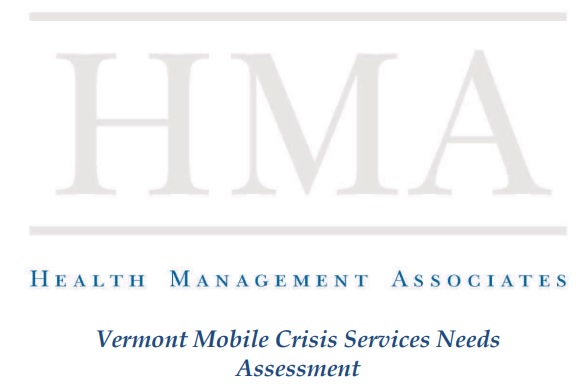On Aug. 1, the Vermont Department of Mental Health (DMH) distributed a “notice of intent to procure community-based mobile crisis intervention services.” The document announced an upcoming request for proposals (RFP), whereby, in November, DMH will solicit vendors to deliver “a statewide unified, equitable, mobile crisis response system of care that is community-based and addresses the needs of people experiencing a mental health and/or substance use related crisis,” starting next year.
DMH has long encouraged its Designated Agencies to offer mobile crisis response services but has acknowledged that they haven’t had the resources to implement robust or expansive programs. In 2021, a $600,000 appropriation by the state legislature funded a one-year regional mobile response pilot by Rutland Mental Health Services, with the stated intention of decreasing local emergency department visits for psychiatric care among children by deploying rapid-response teams to homes and schools.
Financed by the American Rescue Plan Act’s COVID-19 recovery stimulus, the pilot aimed, in part, to demonstrate the feasibility of a permanent, statewide, 24/7 mobile response system that, through compliance with federal regulations, would ultimately sustain itself by drawing Medicaid dollars. Last fall, the Vermont Agency of Human Services used a federal planning grant to contract Health Management Associates (HMA), a consultancy firm, to help design such a system. DMH expects to receive a one-year extension on the grant to facilitate additional work, according to a spokesperson.
Input from clinicians, first responders, public officials, mental health consumers, peers, and others has informed HMA’s research through surveys, interviews, and focus groups. A “Vermont Mobile Crisis Needs Assessment” appeared in June.
Its guidance included an instruction to include peers within mobile crisis teams, based on evidence that the use of peer support during mental health crises reduces the likelihood of hospitalization. State guidelines for existing mobile crisis services in Vermont do not demand a peer component, but the legislature’s appropriations bill for fiscal year 2022 set parameters for their forthcoming expansion, and among these was a mandate to hire “peer support staff.”
“SAMHSA deems incorporation of peers within the mobile crisis team as a best practice. CMS also recognizes the value of peer integration, noting that best practices include incorporating trained peers who have lived experience in recovery from mental illness and/or substance use and formal training within the mobile crisis team,” HMA found.
The needs assessment directly quotes SAMHSA, an agency within the US Department of Health and Human Services: “For community-based mobile crisis programs, incorporating peers can add complementary qualifications to the team so that individuals in crisis are more likely to see someone they can relate to while they are receiving services. Peers should not reduplicate the role of behavioral health professionals but instead should establish rapport, share experiences, and strengthen engagement with the individual experiencing crisis. They may also engage with the family members of (or other persons significant to) those in crisis to educate them about self-care and ways to provide support.”
According to SAMHSA, mobile crisis teams should “respond without law enforcement accompaniment unless special circumstances warrant inclusion in order to support true justice system diversion.”
DMH’s letter of intent indicates that the department expects to contract a different vendor for crisis response in each region of the state. Each vendor must have “three or more years of experience in providing services to people with mental health and substance use issues.”
Responses to the upcoming RFP must arrive by December, with DMH expecting to award contracts in February next year, about a month after delivering a report to the legislature on the results of the Rutland pilot and the status of the anticipated expansion of services. If all goes to plan, statewide operations will begin on Sept. 1, 2023.

